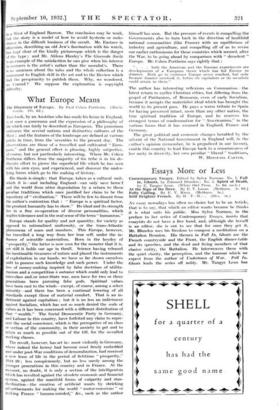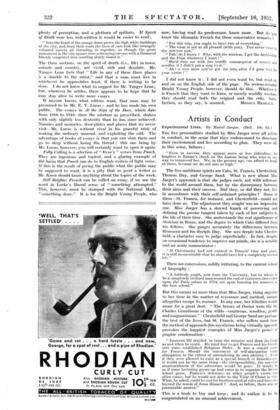Essays More or Less
Contemporary Essays. Edited by Sylva Norman. No. 1. Fall
In, Ghosts, by Edmund Blunden : No. 3, Spirit of Death, by E. Tangyo Lean. (White Owl .Press, Is. 6d. each.) Still Brighter French. By H--T—R.—. (131es. 5s.)
AN essay nowadays has often no choice but to be an Article, that is to say, that which an editor wants because he thinks
it is what suits his public. Miss Sylva Norman, • in the preface to her series of Contemporary Essays, insists that
essayists do not have a free hand, and, 'although she herSeff is an editor, she is out to see that for once they get it. Mr. Blunden uses his freedom to compose a meditation on a
Battalion Reunion. His themes in Fail In, Ghosts are the French countryside and the Front, the English dinner-table and its speeches, and the dead and living members of that
elusive entity, the Battalion. He interweaves them with the quiet clarity, the perception, and the humour which we expect from the author of Undertones of War. Fall In, Ghosts leads the series off nobly. Mr. Tangye Lean has plenty of perception, and a plethora of epithets. If Spirit of Death were less well-written it would be easier to read : "Into the heart of the orange dome pierce the high white buildings of the city, and from their roofs the lines of cars look like strangely coloured insects all threading in together, as though the great monument in the city square were a decaying carcass with a thousand blackly congested dots crawling slowly round it."
The three sections, on the spirit of death (i.e., life) in town, suburb and country, are vivid, rich and desolate. Mr.
Tangye Lean feels that Life in any of these three places is a shackle to the artist," and that a man must live in whichever he appreciates least, if there is writing to be done. I do not know what to suggest for Mr. Tangye Lean ; but, wherever he settles, there appears to be hope that he may stay alive to write more essays.
If anyone knows what editors want, that man may be presumed to be Mr. E. V. Lucas : and he has made his own public. The essays in At the Sign of the Dove, which date from 1910 to 1919, show the mixture as prescribed, shaken with only slightly less dexterity than he has since achieved. Nannies and monocles, door-plates and places that we never
visit—Mr. Lucas is without rival in his graceful trick of making the ordinary unusual, and exploiting the odd. The advantage of books of essays is that you can shut them and go to sleep without losing the thread : this one being by Mr. Lucas, however, you will certainly want to open it again.
Folk Calling is a selection of " Evoe's " verses from Punch. They are ingenious and topical, and a glaring example of the harm that Punch can do to English writers of light verse. If this is the result of giving the public what the public may
be supposed to want, it is a pity that so good a writer as Mr. Knox should know anything about the topics of the week.
Still Brighter French can be called an essay, if we use the word in Locke's liberal sense of "something attempted."
This, however, must be stamped with the National Mark, "something done." It is for the Bright Young People, who
now, having read its predecessor, know more. But do you know the idiomatic French for these consecutive remarks ?
"For this trip, you ought to have two of everything." "The vicar is not at all pleased (with you). You never come to the services now."
" Pah! do I worry ? Why, with the wireless, I get the Archbishop and the Pope whenever I want ! "
"She'd ruin me with her terrific consumption of records and needles, if I -didn't put a stop to it."
a nice mess you've got me into, after I'd gone bail for your virtue ! "
I did not know it : I did not even want to, but read on and on on the English side of the page. No serious-minded Bright Young People, however, should do this. Whether it is French that they want to learn, or merely worldly wisdom, they should, read both the original and the crib. Satis- faction, as they say, is assured. MONICA REDLICH.































 Previous page
Previous page